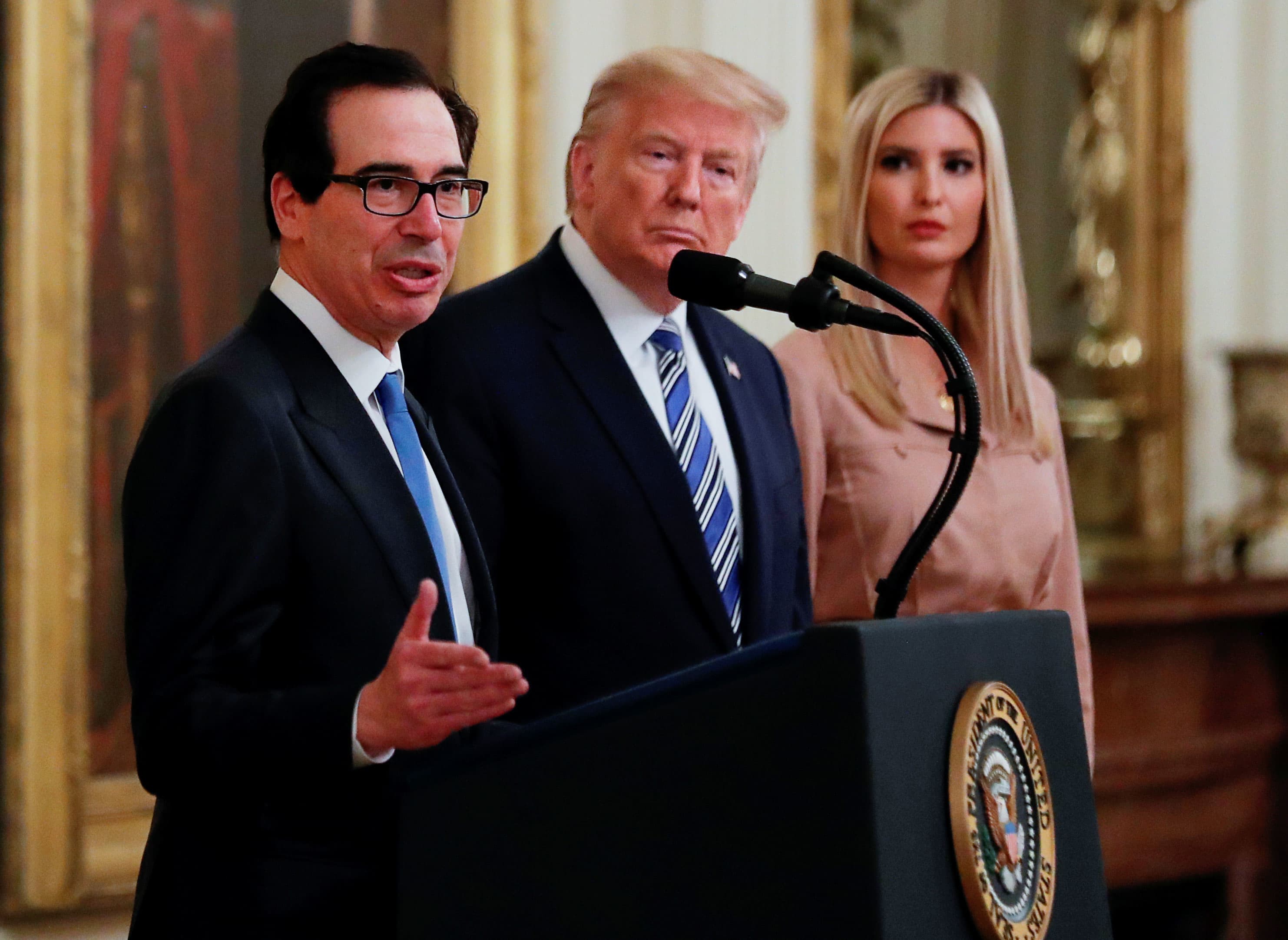Treasury Secretary Steven Mnuchin speaks as U.S. President Donald Trump and White House senior adviser Ivanka Trump listen during an East Room event highlighting Paycheck Protection Program (PPP) loans for small businesses adversely affected by the coronavirus disease (COVID-19) outbreak, at the White House in Washington, U.S., April 28, 2020.
Carlos Barria | Reuters
The Treasury Department and Small Business Administration on Monday disclosed the names of many of the small businesses to which it lent money under a program intended to blunt the economic damage from the coronavirus pandemic.
The disclosure comes amid demands from Democrats for more transparency around the Paycheck Protection Program, or PPP, funds established as part of the $2 trillion CARES Act, which President Donald Trump signed this spring.
[The full list is available on the Small Business Administration website, which you can access here. We are combing through the data now.]
Treasury Secretary Steven Mnuchin sparked an outcry from Democrats when he originally implied the Trump administration would not disclose the names of participants. The Treasury and SBA later reversed course, saying they would disclose names and other details about businesses that took PPP loans of $150,000 and above.
Those loans represent nearly three-fourths of total loan dollars approved, but a far smaller proportion of the number of actual loans. About 87% of the loans were for less than $150,000, according to the SBA.
The SBA released other details about the program Monday, including:
- It has approved 4.9 million loans for a total of more than $521 billion.
- Companies said that the funding supported more than 51 million jobs. But the businesses reported the total when they applied for loans, and it is unclear how many of those employees stayed on payroll.
- The program has about $132 billion in funding remaining.
- The average loan is $107,000.
- Applicants in California received the most money overall with $68.2 billion, followed by Texas at $41.1 billion and New York at $38.3 billion. Businesses in California ,Texas and New York that received loans reported having about 4.1 million, 2.7 million and 2 million total employees, respectively.
- Businesses in economically distressed areas as designated by the SBA got nearly 23% of the loan money, while companies in rural areas received about 15% of the funds.
- Industries getting the largest share of net PPP dollars were health and social assistance, professional, scientific and technical services, construction and manufacturing.
The PPP’s goal is to offer forgivable loans to smaller businesses, helping them to stay afloat and employees to maintain their jobs as the coronavirus puts the U.S. economy on hold.
Companies that maintain most of their payroll through the span of the loan may convert those funds into a grant.
Among the notable recipients is Joseph Kushner Hebrew Academy in New Jersey, which is named after Trump’s son-in-law and advisor Jared Kushner’s grandfather and got a loan in the range of $1 million to $2 millions. Jared Kushner’s parents’ family foundation supports the school, NBC reported.
While the aim of the program was to aid ailing companies with less than 500 employees, its effectiveness has remained unclear. Larger and public companies initially took advantage of loosely written language to tap the funds for themselves.
Ruth’s Hospitality Group, which owns the Ruth’s Chris Steak House chain, AutoNation and ShakeShack are among those that took out PPP loans. So did the Los Angeles Lakers.
They — and many more companies — ultimately returned the money after public outcry. More than $30 billion in loans were returned overall, senior administration officials who declined to be named said Monday.
Lawmakers have also pushed to find out if politicians or their families’ have taken on funds from the program. Rep Vicky Hartzler, R-Mo. on Thursday disclosed that her family’s businesses received nearly $480,000.
The program was initially rolled out in April, offering $349 billion to small businesses. After those funds quickly ran out, the government replenished the program with an additional $310 billion.
The program’s critics have expressed concern the amount of untapped funds could show that rural or minority-owned businesses with weaker or no banking relationships have had trouble accessing relief money. More than 40% of Black small-business owners were forced to close shop as result of the pandemic.
Democrats have sought assurances programs established to help Main Street sufficiently reach those who most need it. The bill Congress passed to replenish the program in April included $60 billion specifically for small lenders in response to concerns about businesses without a traditional banking relationship accessing loans.
Last month, Congress passed a bill easing the terms for how businesses can use the funds and qualify for forgiveness. It lowered the share of the loan that must a company must spend on payroll and gave them a longer period of time to use the money.
The House of Representatives followed the Senate in passing a measure Wednesday to extend the program’s application deadline from June 30 to Aug. 8.
Trump on Saturday signed into law a temporary extension of the PPP, setting a new application deadline of Aug. 8 from June 30. Both chambers of Congress voted to approve the extension last week.
— CNBC’s Kate Rogers and Betsy Spring contributed to this report
A pedestrian wearing a protective mask walks past a Shake Shack restaurant in Washington, D.C., U.S., on Monday, April 20, 2020.
Adnrew Harrer | Bloomberg | Getty Images
